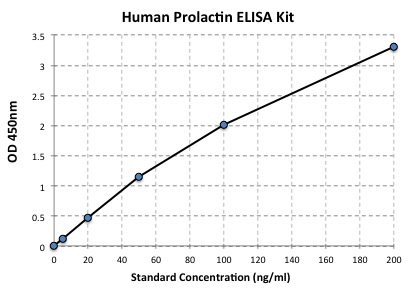More info
Prolactin (PRL), also known as luteotropic hormone or luteotropin, is secreted from the pituitary gland in response to eating, mating, estrogen treatment, ovulation, and nursing. Prolactin is secreted in a pulsatile fashion in between these events. Prolactin plays an essential role in metabolism, regulation of the immune system, and pancreatic development. Prolactin also plays a wide range of other roles in both humans and other vertebrates. Prolactin also acts in a cytokine-like manner and as an important regulator of the immune system. It has important cell cycle related functions as a growth-, differentiating- and anti-apoptotic factor. As a growth factor, binding to cytokine like receptors, it also has profound influence on hematopoiesis, angiogenesis and is involved in the regulation of blood clotting through several pathways. The hormone acts in endocrine, autocrine, and paracrine manner through the prolactin receptor and a large number of cytokine receptors.


